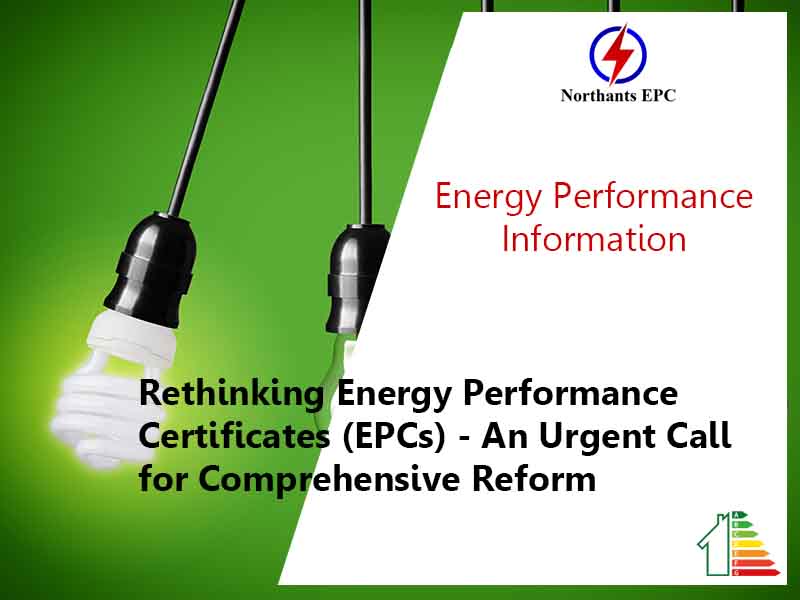Rethinking Energy Performance Certificates (EPCs) – An Urgent Call for Comprehensive Reform
*Introduction*
In the midst of the ongoing energy efficiency discourse, discussions about potential changes to the minimum Energy Performance Certificates (EPCs) for private rental properties have taken center stage. However, the prevailing environment offers a unique opportunity to move beyond mere target adjustments and critically evaluate the very essence of EPCs. Is reform possible, or should we consider an outright replacement?
**The Conservatism of Pro-EPC Advocates**
In the realm of EPCs, proponents have often displayed a conservative outlook, seemingly resistant to embrace substantial changes. Yet, in light of mounting evidence, the need for reform is becoming increasingly difficult to ignore.
**Unmasking EPC Inaccuracies**
A watershed moment occurred when The Sunday Times unveiled shocking findings from meticulous research conducted by CarbonLaces. The revelations exposed EPCs as, at best, unreliable and, at worst, easily manipulated tools. The research meticulously compared EPC estimates against actual energy consumption data obtained from smart meters, revealing an astonishing 344 percent overestimation of energy use.
**The Reality Gap: EPCs vs. Actual Energy Use**
Scrutinizing a dataset encompassing over 17,000 homes, the study uncovered a glaring disconnect between EPC ratings and real-world energy usage. Average metered energy consumption stood at a mere 125 kWh per square meter per year, a staggering 91 percent lower than the EPC claims of 239 kWh/m²/yr. The disparities were even more pronounced for lower-rated properties, with a staggering 344 percent divergence in properties with the lowest G rating.
**Beyond Energy Overestimation: Inaccurate Carbon Emissions**
The deficiencies of EPCs extended beyond energy misestimations to inaccurately calculated carbon emissions. The discrepancies ranged from a substantial 20 percent for EPCs rated C to an alarming 308 percent for EPCs rated G.
**Manipulation and Compliance: The EPC Paradox**
The CarbonLaces investigation not only unveiled EPC inaccuracies but also laid bare the tactics employed by developers and contractors to secure favorable ratings. This hinted at a system more concerned with ticking boxes than with promoting genuine energy efficiency.
**The Deafening Silence: Acceptance of the Problem**
The conspicuous lack of credible rebuttals to this exposé speaks volumes, suggesting an industry-wide acknowledgment of the deficiencies in the current EPC system. While a single investigation might not universally indict EPCs, the resounding silence serves as a tacit endorsement of the problems at hand.
**Personal Experiences and Growing Skepticism**
Personal anecdotes from individuals across the nation further fuel the growing skepticism surrounding EPC assessments. These accounts offer real-world context to the concerns raised by the CarbonLaces study.
**Pursuing a Replacement: Easier Said Than Done**
Replacing the current EPC system poses a significant challenge, one that requires careful consideration and expertise. While I lack the qualifications to propose an alternative, the concept of assessing a building’s thermal losses during operation, both at construction and sale, holds promise.
**Seeking Reform: RICS Recommendations**
The Royal Institution of Chartered Surveyors (RICS) has joined the call for substantive changes to EPC calculations. RICS advocates for placing emphasis on a property’s final energy consumption, carbon emissions, and energy costs to better align with government objectives.
**Frequent Assessments and Technological Advancements**
Amid the rapid evolution of technology, some voices, potentially with vested interests, call for more frequent EPC assessments. The current decade-long interval might prove inadequate to address the rapidly changing energy landscape.
**The Need for Deliberate Discussion**
As the discourse on energy efficiency intensifies, both within the industry and beyond, it’s essential to ensure that the debate remains grounded in careful consideration. Knee-jerk reactions must be avoided at all costs.
**Beyond Short-Term Expediency**
The landscape is rife with instances of performative actions by politicians and pressure groups, driven by the desire to appear proactive without evaluating the efficacy of EPCs. What we truly need is a thorough, deliberate effort to understand the purpose of EPCs and determine the best strategies to achieve their intended objectives.
**Conclusion: Embracing the Challenge**
While this endeavor may be time-consuming and require substantial effort, it’s imperative that we muster the energy and commitment for a comprehensive review. The question that remains is whether we are prepared to undertake this vital task. In a world brimming with urgency, let’s make sure that the course we chart is one of thoughtful introspection and sustainable change.
